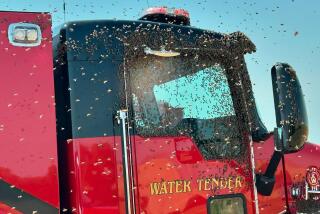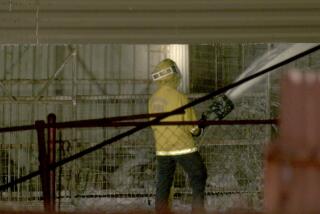Officials Don’t Believe Bees Were ‘Killers’
- Share via
There is no evidence the bees that attacked construction workers in Aliso Viejo on Friday, sending one man to the hospital and injuring several others, were Africanized honeybees, a county entomologist said Monday.
Based on the details of the attack, and the recommendation of the pest control company that responded to the scene, the county won’t be testing to determine the type of bees involved, said Nick Nisson, an entomologist with the Orange County Agricultural Commissioner’s office.
In Friday’s attack, seven people suffered between six and 10 stings each after a construction worker disturbed a hive in a storage container. One man collapsed after being stung 10 times and was treated at a hospital.
“Typically, with Africanized honeybees, we’re talking about 15 or more stings to an individual,” Nisson said.
Africanized honeybees, the so-called “killer bees,” are relentless in their attack, sometimes stinging an individual hundreds of times, Nisson said.
Still, the more common and docile European honeybees can also launch an aggressive attack when their hive is disturbed, Nisson said.
“With any colony of honeybees, even European honeybees, if their colony is upset or disturbed, that number of stings would be typical,” Nisson said.
The only way to determine whether a bee is Africanized or the European variety is through genetic testing, Nisson said.
Pest controllers who were called to the construction site after Friday’s attack said the bees that remained in the hive showed no aggression toward the crew.
Africanized bees would have attacked the workers the moment they approached, said Marsha Bryant, of The Bee Man, a bee-removal business in Aliso Viejo.
“And when the crew went to remove the hive [Monday], the bees again did not act like Africanized honeybees,” Bryant said. “They showed no aggressive behavior at all. So the probability is that they are not Africanized.”
Based on the crew’s assessment, Bryant said the company would not be sending samples of the insects to county agricultural authorities for genetic testing.
Nisson said county agricultural officials do not require the tests in bee attacks.
“The genetic makeup of bees is only of interest to researchers and people involved in education,” Nisson said. “It’s of no relevance to medical treatment or the protocol in handling a swarm situation.”
More to Read
Sign up for Essential California
The most important California stories and recommendations in your inbox every morning.
You may occasionally receive promotional content from the Los Angeles Times.










